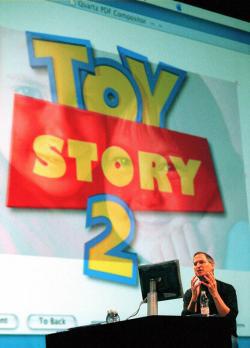The first computer I ever used was an Apple IIe. My college graduation gift from my parents was a PowerBook 520c. The item I most yearn for is an iPad, and if I didn’t need one for work, I wouldn’t let a PC darken the doorstep of my home. So I’m mourning the death of Steve Jobs like every other Mac geek. But as much as I enjoy my iMac and my iPod and everything else he gave the world, what I’m most grateful for is his gift to parents: Pixar.
Pixar, the division of Lucasfilm Ltd. that Jobs bought and re-created in 1986, first garnered the attention of the masses when Toy Story was released in 1995. I loved it. The animation was dazzling, the story was touching, and the cast was exceptional. I didn’t have kids then, but I knew that someday, when I did, I’d want them to see this movie. And then I saw Bug’s Life, and I knew when I had kids I would want them to see that movie, too. Same with Toy Story 2 and Monster’s, Inc. and so on. My as-yet-to-be-conceived children offered a great cover for purchasing these movies—but they were great to watch even without little ones.
When I actually had kids, I realized what a tremendous benefit Pixar really was. Sure, you might tell your childless self that your children are not going to watch too much television, or that you’ll limit them to Sesame Street and whatever other educational fare that PBS offers. But then you have your first bout with rotavirus or a bad reaction to vaccinations, and your child has been cranky for 12 hours and you simply cannot take any more Elmo or Baby Einstein. You reach for the Toy Story DVD and pop it in and … ahhhh … sweet relief.
Pixar movies might not be overtly educational, but they are of such tremendous quality that I would far rather have my children watching them than many shows that profess to teach. I work from home, and there have been (very infrequent) occasions—snow days, sick kids—where my regular childcare arrangements are not an option, and yet it is not ideal to take a sick day. When I send email to my co-workers that “baby-sitting is being provided by Pixar today,” I’m only half-joking. (Buzz Lightyear can defeat the Evil Emperor Zurg, but he can’t make PB&J. Though I suppose, one day, there may be an app for that.) When we do sit down with the kids for some family entertainment, I know that if a Pixar movie is on, I won’t be wandering out of the room 20 minutes later wondering if there is something more interesting I could be doing, like the laundry.
More broadly, much like Starbucks improved our collective palate for high-end coffee and created a market for $5 lattes that left room for other coffee outlets, Pixar raised the bar for children’s entertainment and inspired imitators like DreamWorks Animation and Sony Pictures Animation that, while not as consistently good as Pixar, have turned out great family films like How To Train Your Dragon, Monsters vs. Aliens, and Cloudy With a Chance of Meatballs. These movies are light years better than what I grew up with in the ‘80s, and there is such a wide selection that even if we do occasionally overindulge our children with movies, neither parents nor kids are subjected to the mind-numbingness of watching the same movie 30 times in a row.
As Farhad Manjoo pointed out in his Jobs obituary in Slate, Steve Jobs didn’t personally invent many of the things that Apple is famous for: “Rather, his role was to separate other people’s great ideas from their terrible ones—and to refine the best ideas into workable products.” So, too, with Pixar. Steve Jobs wasn’t an animator or a director. But he put Pixar in the hands of people who were, like John Lasseter, who worked with Lucasfilm before it was Pixar and who has overseen all of the studio’s films. Together they turned Pixar into the company that Disney paid $7.4 billion for in 2006.
After a long week of work for parents and school for the kids and soccer practice for all, Friday night is movie night in our household. When we curl up with our pajamas and popcorn this week, there’s only one movie that I can think of that will be a fitting tribute to Steve Jobs: The Incredibles. For anyone who might have missed this one, the protagonist, Mr. Incredible, spends his life fighting the mediocrity that settles over society when superheroes are forced underground. From the Macintosh Classic to the iPod and the iPad and everything else, Steve Jobs railed against mediocrity. He truly was exceptional.
